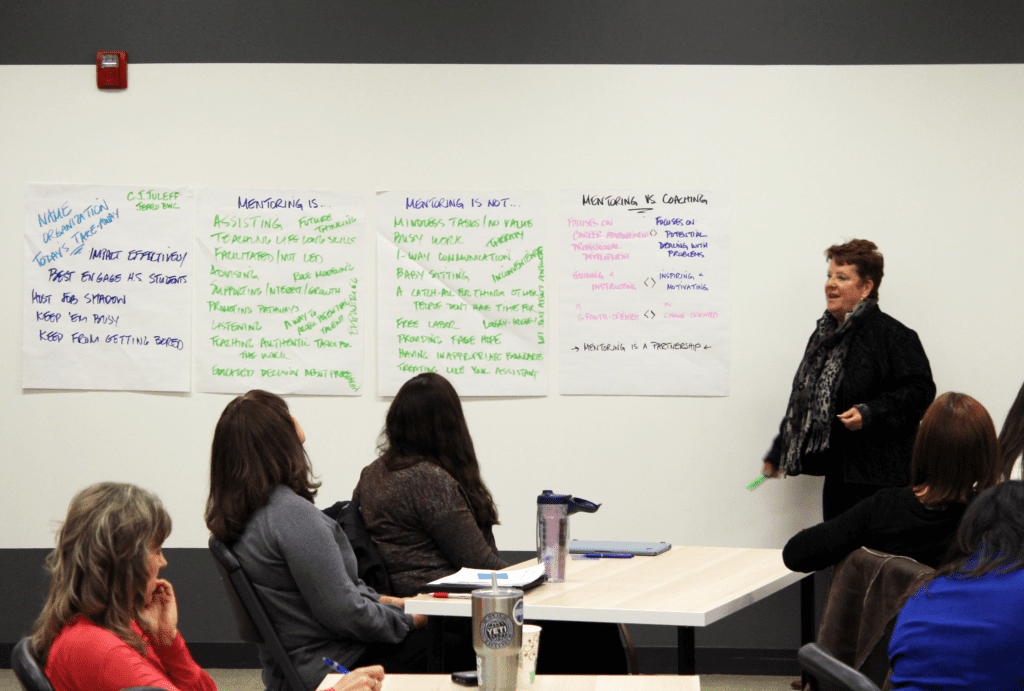On May 7, the Arvada Chamber of Commerce hosted the Arvada Works seminar “How to Host Work-Based Learning Experiences at Your Business.” C. J. Juleff, M.A., from the Jefferson County Business & Workforce Center, led a discussion on best practices for hosting mentoring, internships and job shadowing at a place of business.
“Work-based learning is the greatest gift you can give our youth,” said Juleff, who has advised on work-based learning in a variety of arenas, including teaching, corporate consulting, organizational development and finance. Below, read employers’ top learnings from this workshop and find local resources to assist in work-based learning.
Four Employer Aha Moments From the Seminar
- “There are glaring and subtle differences between an internship and mentoring.”
Work-place learning experts are moving away from internships and toward mentoring. Internships tend to be task-oriented, whereas mentoring is a mutually beneficial professional development relationship. Mentoring is about motivating and empowering an individual to identify their own issues and goals and helping them find solutions. And with mentoring, while your staff takes an active role in supporting the mentee’s growth, the team can better understand its own roles, strengths, and leadership skills. - “I shouldn’t look at mentorship capacity as ‘What will make the most for me,’ but instead ‘What makes the most for the mentee.'”
Mentoring is a partnership. This requires a shift of thinking from “What tasks can a mentee do?” to “What will make a mentee successful?” The first step in a productive work-based learning program is to establish a win-win relationship between the mentor and mentee. Document basic questions a mentee needs to know, clarify role expectations for both parties and set goals. These should be established in your Mentoring Agreement (PDF). - “I never thought of setting the goal for the mentee. That really helped me waking up in the morning and wondering what they’re going to do.”
Sit down with your mentee and set S.M.A.R.T. goals (Specific, Measurable, Attainable, Relevant, and Time-Bound). Document and review these goals in a Mentoring Goals & Action Plan worksheet (PDF). These types of goals will give the mentee something to focus on during their time with the company, as well as giving the mentor a starting point on where to base their education and learning. Many businesses decide to incorporate a mentoring scheme to help with the progression of employees through the company, and some may look at these mentoring use cases that can provide them with all the tools they need to help deliver high-quality mentorship. It can make all of the difference in the long run. - “Listening is the most critical skill, rather than just imparting your knowledge”
According to Juleff, one of the top qualities of an effective mentor is listening. Listening is the communication skill we use most frequently (accounting for roughly 45% of our communication time), it is also the skill in which we’ve trained for the least. We have much more formal training in other major communication skills – writing, reading, and speaking. Being a mentor is a great way to practice your active listening skills: rather than immediately interject with solutions, ask questions to get all of the problems, issues, and troubles out, and then help the mentee work through a process to come up with their own solutions.
Key Work-Based Learning Resources
- Jefferson County Business & Workforce Center. Find resources and information on economic development, occupational data, workforce and community colleges. Download their expansive Mentor Tips packet here.
- Career Explore Program. This unique Jefferson County program started in the Fall of 2017 and offers at-risk students career readiness activities and internships. Currently, five high schools in the district participate: Golden, Wheat Ridge, Dakota Ridge, Chapel, and Arvada. With a 92% success rate, the program encourages dignity in all work, allowing students to investigate and challenge themselves to find what they want to do.
- Warren Tech. The career and technical high school serves all of Jefferson County with North and Central campuses. The school offers students professional programs with certifications to go out in the community and work. Currently, there are not enough opportunities for all students.
- Colorado Homebuilding Academy. Students attend a two-semester program, one of which is all hands on, and gain certification necessary for the construction sector. Students get 160 hours of paid internship time and jobs can turn to part-time, FT, or summer employment into the pathway. The program is looking for more companies to offer internship opportunities.
- CareerWise Colorado. A first-of-its-kind statewide youth apprentice system that brings together public and private stakeholders to prepare students with the skills and knowledge they need for financial and academic success. Apprenticeship pathways include advanced manufacturing, information technology, healthcare, financial services, and more.
Are you ready to help improve our local talent pipeline? The Arvada Works program relies on the varied contributions of our community employers, educators and partners. If you’re interested in helping us close the skills gap in Arvada, there are many ways for you to get involved today! Click here to learn more about the program, sign up to receive updates, and discover how you can help make impact.



0 Comments